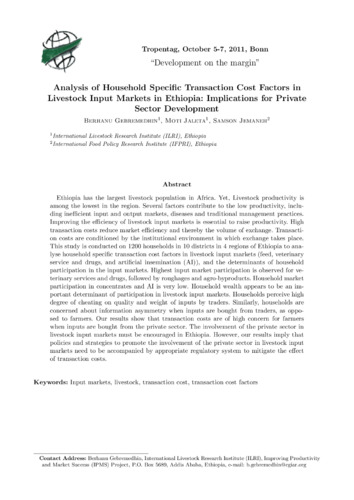Analysis of household specific transaction cost factors in livestock input markets in Ethiopia: Implications for private sector development
Abstract
Ethiopia has the largest livestock population in Africa. Yet, Livestock productivity is among the lowest in the region. Several factors contribute to the low productivity, including inefficient input and output markets, diseases and traditional management practices. Improving the efficiency of livestock input markets is essential to raise productivity. High transaction costs reduce market efficiency and thereby the volume of exchange. Transaction costs are conditioned by the institutional environment in which exchange takes place. This study is conducted on 1200 households in 10 districts in 4 regions of Ethiopia to analyse household specific transaction cost factors in livestock input markets (feed, veterinary service and drugs, and artificial insemination (AI)), and the determinants of household participation in the input markets. Highest input market participation is observed for veterinary services and drugs, followed by roughages and agro-byproducts. Household market participation in concentrates and AI is very low. Household wealth appears to be an important determinant of participation in livestock input markets. Households perceive high degree of cheating on quality and weight of inputs by traders. Similarly, households are concerned about information asymmetry when inputs are bought from traders, as opposed to farmers. Our results show that transaction costs are of high concern for farmers when inputs are bought from the private sector. The involvement of the private sector in livestock input markets must be encouraged in Ethiopia. However, our results imply that policies and strategies to promote the involvement of the private sector in livestock input markets need to be accompanied by appropriate regulatory system to mitigate the effect of transaction costs.

